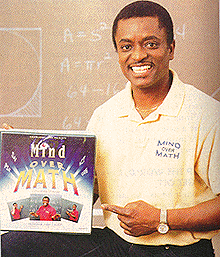|
Terry Caliste walked into the math department at Southern University in 1980 with every intention of dropping
out of school. Never mind that two years in the Air Force and four years as general manager of several fast
food restaurants should have prepared him for many of life's challengess. Scorched by a failed algebra test,
the 23-year-old wanted out. "You're not dropping out!" shot back Dr. Myrtle Smith, the department chairperson. "It was the symbolic kick in the butt I needed," recalls Caliste, 39, whose necktie of choice today is peppered with algebraic problems. "She taught me how to acquire knowledge and built my confidence in a subject that was intimidating." In a dramatic turn of event, Caliste fell in love with math, and even ended up tutoring others. In three years, he graduated with honors, with a major in mathematics and a minor in computer science. Two successful college internships at AT&T Bell Laboratories (which later included Bell Communications Research and NYNEX) in Holmdel, New Jersey, opened the doors to a job in quality assurance in 1983. Extremely analytical, Caliste was quickly targeted for the management fast track. AT&T sent him to Iowa State University, where he received a master's in statistics. By 1986, Caliste was troubleshooting problems in technology projects and conducting quality audits and inspectons for such clients and MCI and Simi Valley high-tech companies. Nonetheless, Caliste, a high-spirited man with a contagious smile, missed seeing the familiar light that went on the moment a student grasped a difficult math concept. He longed to pursue his dream of teaching. "I thought that if I didn't leave now, I would be stuck. I was taking risks for these people everyday. I wanted to take a risk for me and my family." So in 1992, after nine years as a technical statistician, he "retired" with a $30,000 buyout, nine |
months' severance pay and modest savings. For his wife, Margie, 39, who worked part-time as a cashier, daughter, Quashaunda, and son, Terry Jr.--now 21- and 12-years-old, respectively--it meant a lot of belt tightening. "I was humble enough to take some great steps back financially--we ate a lot of beans," jokes Caliste, who loves the Creole cooking of his New Orleans hometown. Howerver, his mother was horrified, and friends thought Caliste was crazy to leave the security of a $60,000 job and out his family in jeopardy to work as an adjunct math teacher. All combined, his salary from two local colleges and private tutoring classes totaled $25,000 a year at best. While he was happy teaching, the classroom allowed Caliste to reach only 20 or 30 students at a time. He wanted a larger audience. In 1993, without fancy bells or whistles, just a blackboard, some chalk and loads of enthusiasm, Caliste launched his company, Knowledge Base, in Red Bank, New Jersey. He conducted math seminars and worshops in schools across the country, and soon launched the show Knowledge Base on New Jersey public access television. His income slowly increased, yet Caliste began to feel as though he had run his course. "I had reached the curve that made me a man in this business. I cried some nights about the sacrifice I had made and reached a point where most people bail out." His only inspiration was the 60-70 phone calls and hundreds of letters he received each week from thankful parents. They made him press on. Today, Knowledge Base is broadcast in |
 A mathematics whiz, Caliste left AT&T to teach. His decision spawned a television show and video series more than 3 million New Jersey and Louisian households. The show won a Cable Television Network Award in 1995 and was recognized as the No. 1 public-access show in New Jersey. Called the "Pied Piper of Math," Caliste developed a four-part video series in 1995, Mind Over Math, which provides problem-solving strategies and techniques to help increase standardized test scores. "To the kids, I'm entertainment, but when I say SAT scores, Mom and Dad listen because then I'm talking about their child's future," states Caliste, adding that the SAT scores of hundreds of his "students" have increased by more than 75 points. Now, with '96 revenues of more than $100,000 and five investors, Caliste would like to take his show national. "Granted, I might not have done everything right, but I wanted my decision to have a positive effect," he adds. "Math is a universal subject that transcends all races and people. By making it uncomplicated, I knew I could offer something to everyone." |
 Previous Article
Next Article
Previous Article
Next Article
